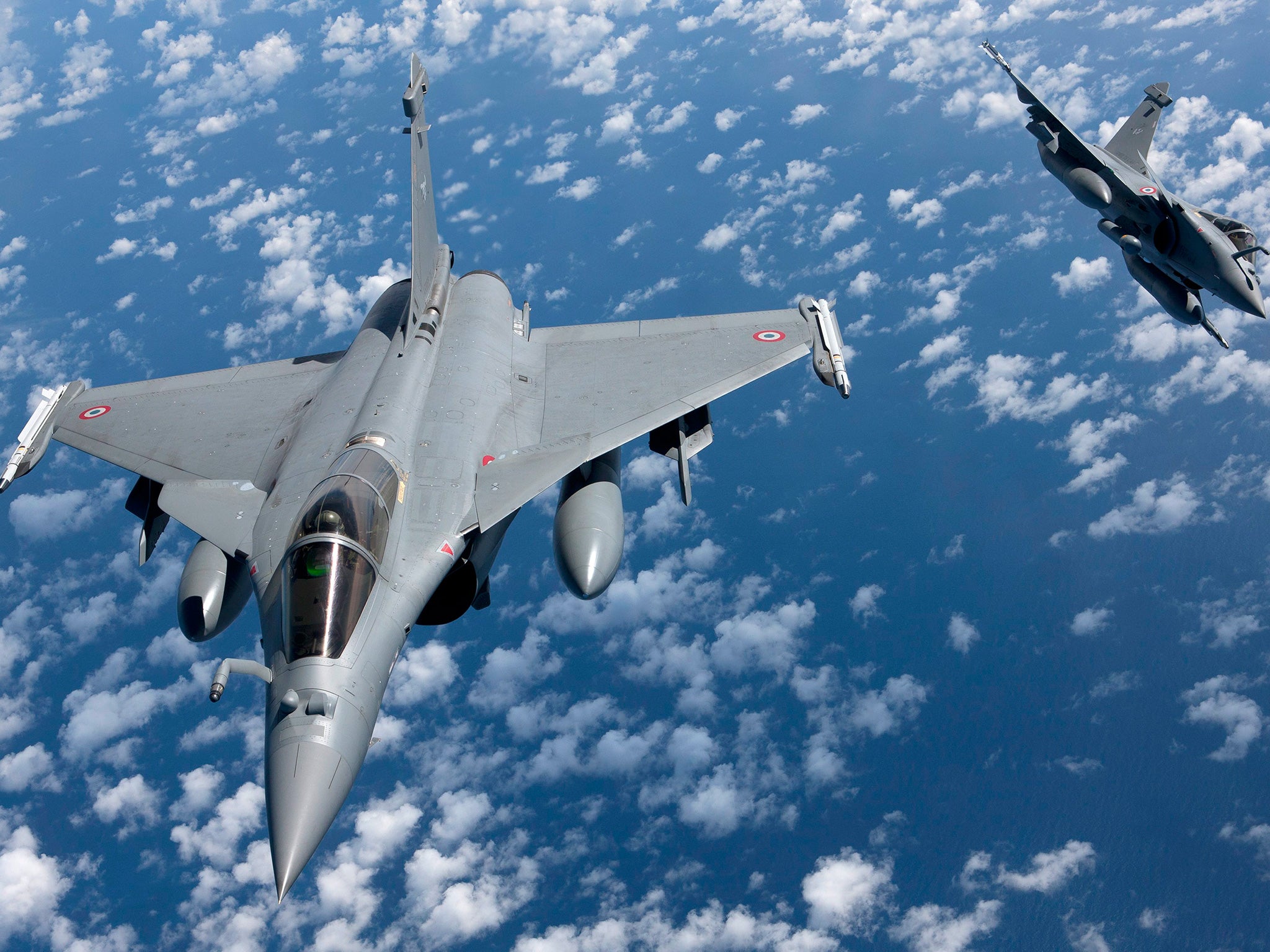Paris terror: EU countries pledge military support as France and Russia launch new air strikes on Isis
EU defence ministers meeting in Brussels made their offer using an EU treaty mutual defence clause provision

European Union countries have unanimously agreed to provide military aid to help France fight Isis in the wake of last Friday’s terrorist attacks in Paris.
The pledge came as the French and Russia both launched new air strikes on Isis targets in northern Syria, and the US announced a new drive to help Turkey seal completely its Syrian border against Isis infiltration.
EU defence ministers meeting in Brussels made their offer using an EU treaty mutual defence clause provision that provides for “aid and assistance” in the event of an attack. It was the first time that Article 42.7 of the Lisbon Treaty had been invoked.
French Defence Minister Jean-Yves Le Drian, hailing the decision as “a political act of great significance”, said he would begin separate talks with individual member states to determine how they could help in practice. “Every country said: I am going to assist, I am going to help,” he said.
France’s plea followed an assessment that its security services were overstretched through French military operations in the Sahel and peacekeeping in Lebanon, as well as in the fight against Isis in Syria and Iraq, Mr Le Drian said.
His European counterparts could assist either by helping to support France’s air strikes against Syria, or in other parts of the world, he said, freeing up French resources to battle Isis. “France can’t do everything,” he said. “It can’t act alone.”

The EU move follows French President François Hollande’s request for solidarity and assistance in his speech to the French parliament on Monday, saying that his country was “at war” with Isis.
Under the Lisbon Treaty, if a member country “is the victim of armed aggression on its territory” other members are obliged to provide “aid and assistance by all the means in their power”. Article 42.7 is similar in language – though not in scope – to Nato’s Article 5. That says an attack on one ally is an attack on all, and was invoked by the US after 9/11. “We’re in a new situation in Europe,” Greek defence minister Panagiotis Kammenos said. “This is September 11 for Europe.” The EU’s foreign policy chief, Federica Mogherini, said: “France has been attacked, so the whole of Europe has been attacked.” The EU “expressed its strongest full support and readiness”, she said, adding several countries “already announced offers or support” – either by sending “material assistance” or by stepping up their involvement in other areas of the world.
Although she acknowledged the move was partly “a political act, a political message”, she said each EU member state would contribute. However, in spite of their loud declarations of support, it was unclear what other EU countries would do to help. German Defence Minister Ursula von der Leyen said her government was “already very engaged in the fight against terror”, including the arming of Kurdish forces which recently made significant gains against Isis in Iraq. A British government spokesman said, “The Prime Minister has been clear that we will do whatever we can to help the French government at this time,” but did not elaborate on how.
Nato itself is helping France, but there are no plans to trigger the Article 5 defence clause to mobilise the alliance’s armed forces. Nato Secretary General Jens Stoltenberg, who joined the EU defence ministers’ meeting, said the alliance was stepping up intelligence sharing with France. “Many Nato allies have offered France support and help... in many different ways,” he said.
10 French warplanes targeted a command post and a jihadi recruitment centre in Raqqa for the second consecutive night and Russia launched cruise missiles against Isis targets in the same area. While Moscow has mostly targeted opponents of Syrian President Bashar al-Assad, but French officials said Russia had responded to Mr Hollande’s appeal for it to join a grand coalition against the jihadi group. Mr Hollande announced last night that he would meet US President Barack Obama and Russian President Vladimir Putin separately next week.
Meanwhile the US Secretary of State, John Kerry, said a ceasefire between Syria’s government and opposition could be just weeks away following talks in Vienna at the weekend. Such an agreement would greatly assist efforts to fight the Islamic State group. He said for now the US was focusing on sealing the remainder of Syria’s northern border to prevent access by Isis. “We are entering an operation with the Turks to shut off the other remaining 98 km (61 miles),” he said.
Join our commenting forum
Join thought-provoking conversations, follow other Independent readers and see their replies
Comments
Bookmark popover
Removed from bookmarks